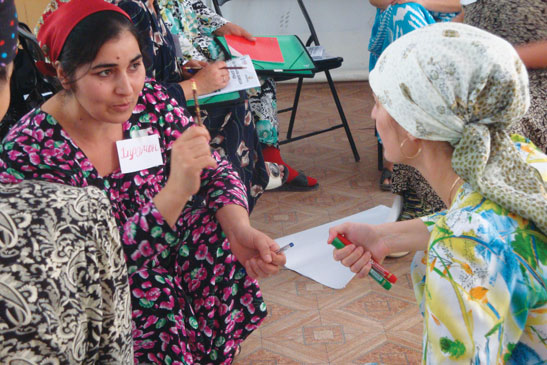TAJIKISTAN:
Schools to Reduce Gender-Based ViolenceNovember 29, 2010
 Tajik teachers role play anti gender-based violence methods.
Tajik teachers role play anti gender-based violence methods.
This past August—for the first time in Tajikistan—USAID’s Quality Learning Project trained 400 teachers from 20 schools and 400 community counselors in prevention techniques and appropriate responses to gender-based violence among students. This training will help teachers to understand their roles as protectors and agents of change and enable them to identify what constitutes violence.
Broaching gender-based violence and focusing on girls’ education in Tajikistan is an important departure. Tajikistan has a traditional, patriarchal culture, oftentimes with strict interpretations of religious faith. Violence against girls is tolerated if not condoned and often girls are removed from school by their families.
As part of the training, teachers and counselors examined the different pressures imposed by families and cultural traditions regarding girls and boys. According to Parvina Asadova, the Quality Learning Project’s Gender Specialist, “Girls wake up at 4 am to pray, then take care of the cows, make beds, breakfast, work in fields prepare lunch, take care of younger siblings and then go to school to come back and prepare supper. The girl child is a woman from the beginning while boys have time to play.”
The USAID Quality Learning Project’s main goal for its School Related Gender Based Violence Project (SRGBVP) is to train teachers and counselors to look at the problem of gender-based violence from a different perspective. Now, newly trained teachers and counselors are looking at both girls and boys for their talents and ability to achieve goals.
“Teachers and community counselors will be able to recognize types of violence and prevent and protect girls as a result of this training. Tajikistan needs to provide its children with child-friendly school environments that are physically safe, emotionally secure and psychologically enabling and that lead to healthy child development,” said Asadova.
During the training, the team found that teachers were not considering the responsibilities and pressures on girls and how this affects their ability to study. Research found that many teachers harbored stereotypes about girls as silly, less intelligent, and not good at math. After the training, teachers will be better equipped to support girls and boost their self-confidence. Importantly, teachers now also have access to a referral and reporting system when violence against a student is suspected. Using case studies teachers were familiarized with real life situations that girls encounter and taught how best to respond to each situation.
“The SRGBVP program teaches how to discipline children, not by employing violence, but by constructive discussion of the issues,” said Asadova. “The manual also provides instruction on the rights of children based on the Convention of the Rights of the Child and articles from judicial law on punishment in the cases on violence against children,” Asadova added.
A team of trainers is imparting anti-gender-based violence practices in Isfara, Kurgan-Tube and Dushanbe. The trainers pre-tested newly adopted modules designed by USAID’s Safe Schools Program and the office of Women in Development in Washington. The Safe Schools Doorways materials were adapted to Tajikistan’s context in partnership with the Academy of Education and Ministry of Education. In its next phase, the Quality Learning Project’s SRGBVP will work with various levels of education specialists including directors, teachers, experts in pedagogy and civil society groups in the Sogd and Khatlon regions.
